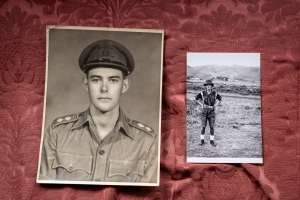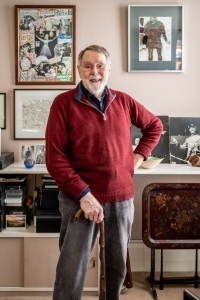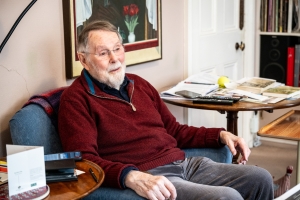“I went on World War One military tours to visit the places where my father and uncle had fought in the trenches. They suffered so much, physically and mentally.”
A child of World War Two, Paul Williamson completed National Service and became a Lieutenant in the Royal Artillery. He then travelled the world, working as an actor for over 60 years.
Paul has generously chosen to leave a gift in his Will to the Army Benevolent Fund (ABF) in support of the Army Family. “I was fortunate to learn about myself and humanity during my time in the Army, but I also know the suffering soldiers and their families can endure. Helping them is important to me.”
Paul was born in Hampstead in 1929. His father was a World War One veteran who had fought in Flanders and on the Somme.
“We lived in the Hampshire village of Steep during the war, and our lives were dictated by austerity, blackouts, and rationing,” he said. “Both my father and older brother were in the Home Guard and I helped out as best I could, on farms, in the Services Canteen and taking part in ‘Dig For Victory’.
“Sadly, my mother died at the end of the war, and our family moved back to London,” said Paul. “I had been lucky enough to go to a very good school where there was a lot of focus on the Arts, and I decided to train as an actor.”
Paul had completed one year of training at RADA when he was called up for compulsory National Service.

“Having come straight from drama school, I felt unprepared for life as a soldier,” he said. “However, after six weeks of basic training I trained as a Gunner in the Royal Artillery. I was eventually commissioned, signed on for another year and eventually finished as a Lieutenant.”
“I think your experience of National Service depends on the type of person you were and where you ended up,” said Paul. “I’m very proud of the time I spent as a soldier and I mixed with lots of people I wouldn’t have otherwise met. It taught me understanding, tolerance, and self-discipline. It made me grow up.”

Paul later embarked on a series of military tours that traced the steps of the soldiers of World Wars One and Two.
“It was a pilgrimage to my father and my uncle, both of whom were mild, bespectacled men,” he said. “My uncle won the Military Cross for an act of bravery, so as I visited these historic regions I thought about the people involved. Like my grey-haired postman, who was featured in a famous clip of the British D-Day landing at Sword Beach. He was the second man out of the infantry landing craft, carrying a ladder. It’s humbling to think about.”
Following his time as a soldier, Paul resumed his studies at RADA. He met and married a fellow performer Clare, with whom he spent 53 years.
“Clare was a very good person who influenced me in many ways,” said Paul. “We lived in Chiswick, where my family also lived, and I where I still live today.”
As an actor, Paul performed on stage all over the world, as well as appearing on television and radio. “I appeared in The King and I at the London Palladium and was able to command the stage, in front of an audience of thousands, without any help from a microphone. That could have been down to years of shouting fire orders to my guns!”

“In the Army, every regiment is a family and you look after each-other. I want that support to continue even after I’m gone.”
Now 95 years old, Paul spent his later years doing volunteer work, including caring for his local war memorial and coaching children to read. “I hope people might say I was a reliable, pleasant, and conscientious type of person,” he said.
He first heard of the ABF during his time as a soldier. “Looking after people in trouble and difficulty is so important. Soldiers can go through so much suffering and then when they leave service they enter a completely different world. They need support in many ways and it’s reassuring to know charities like the ABF are there for them.
“I hope that by leaving the ABF a gift in my Will, I can continue to help people in their time of need.”

